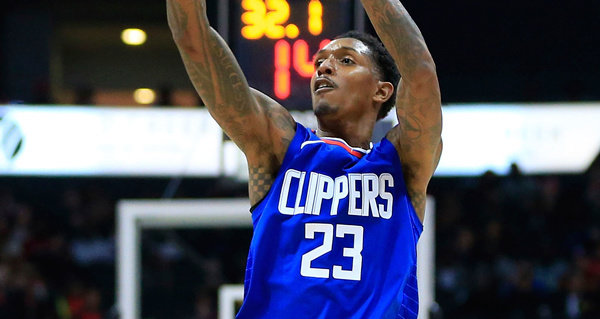Lou Williams isn’t all that unusual, but he stands out in his time. He’s an established type: a shifty, chucking guard who can shoot from range and draw fouls around the rim. He can pass a little bit too, but that’s almost beside the point. Lou is here to get buckets, and quickly. He does his best work in short bursts—ten points in three minutes, fourteen in five, etc. He’s never topped thirty minutes per game in a season, and he’s started fewer than a hundred games in his career. You get the idea no coach has totally trusted him, and you also get the idea, on a night when he’s all flailing drives and unconscionable clanked threes, that coaches are right to be skeptical.
Recent NBA history is densely littered with players similar to Lou Williams—Leandro Barbosa, Jason Terry, Nate Robinson, Earl Boykins, Jamal Crawford, Bobby Jackson, et al.—but it’s notable that he doesn’t have many contemporaries at this particular moment. Terry and Crawford are still kicking around, but they’re thoroughly washed up. Isaiah Thomas and Kyrie Irving do what Lou does at an All-Star level. Brandon Jennings looked set to become Lou Williams-like, then his career fell of a cliff and he’s now playing in China. Dion Waiters might be the closest analogue, but he’s mostly his own strange and beautiful thing. The scoring bench guard, eternal Sixth Man of the Year candidate, is out of vogue. The position’s heyday way the early-to-mid aughts. We’re now firmly in an era where NBA franchises are eager to stock their rosters with guys who look and play like Jaylen Brown.
Which isn’t to say that Lou Williams isn’t in demand. For the second season in a row, he’s likely to get shipped from his moribund team (this year it’s the Clippers, last year it was the Lakers) to a playoff-bound one, because there’s always a market for scoring punch. The Clippers will pick up some Lithuanian teen’s draft rights and a second-rounder, or maybe even a heavily protected first-round pick, and the Bucks or the Wolves (or whoever) will feel slightly better about those uneasy periods of the game when their stars are resting. You can do considerably worse than handing your offense over to Lou for five minutes.
That you can also do a lot better, over the course of a full game, and that Lou is about as useful a defender as a cardboard cutout of himself would be, is why he’s not a bigger deal, and why, given the choice, most teams would rather just have a lanky, athletic dude who can hit threes and chase Klay Thompson around. Lou Williams, in terms of his ability to help you win basketball games, maxes out around Sure, Sometimes, I Guess. It’s worth noting that his playoff résumé is pretty terrible: 11.2 points per game on 37.6 percent shooting with 2.1 assists and 1.3 turnovers per game. He burrows too deeply into his Lou Williamsness when the contests get big. He suffers from postseason refereeing, too: those soft fouls he lives off on in January don’t get called as often in May.
But the thing about Lou Williams is you don’t expect him to save the world. He’s having the best season of his career for an otherwise roundly depressing Clippers team, using the vast blank space Chris Paul left behind to splay an array of dribbles and feints and hypnotically twitchy off-ball cuts. It’s a peculiar, mid-grade kind of thrill—like watching a polished character actor play the leading role in a ho-hum indie flick—to see just how many moves Lou’s got, and how well-honed they are. He can pump fake, shimmy, and dance down the baseline. He can absorb contact and still square his shoulders. He can switch hands mid-drive and finish from any angle. My favorite element of his game is its cool deception. Lou has a rare talent for seeming like he’s doing one thing while he’s doing another. He pulls up in transition and suddenly he’s at the rim, and you question whether he ever slowed down at all. He’s about to penetrate—nope, drained a long triple. Using the screen, now rejecting it. Jumper? Lob. Behind the back out of nowhere. Don’t let him get to his left, and he’s already scored with his right.
There are better players, but when Lou is cooking, he seems unbeatable. You can’t really say the same for a good number of players you would take over him if you were building a team, and that explains his appeal: you know enough not to fall in love with him, but somewhere around the fourth harebrained three-pointer, you fall in love with him anyway. He’s not the only reason to watch the Clippers, but every third game or so, he’s a compelling one.
In a sense, Williams is halfway through a perfect season: he’ll go on scoring twenty-plus per night in Los Angeles, catch on with a playoff team, and get a round or two of meaningful games, a couple of which he might dominate. However it shakes out—whether he rises to the occasion or gets a whit too drunk on himself—it will have been a good year. Because Lou Williams always has a good year, if you check the highlights.



